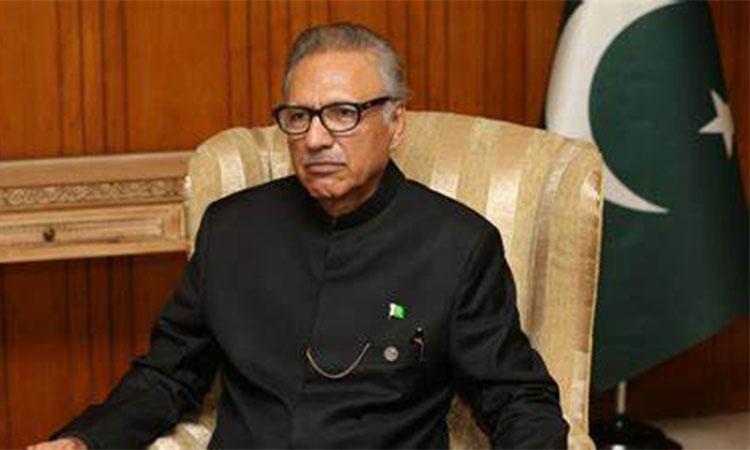Addressing the concluding ceremony of the Margalla Dialogue on November 17 in Islamabad, Pakistan President Arif Alvi accused India of following the policy of "no peace" by ignoring cooperation with his country.
He said that Pakistan has been trying to come to solutions on all its fronts, and regretted that India has "not been able to strike a chord of friendship and cooperation with Pakistan".
Nothing could be far from fact than Pak President's assertion.
Margella Dialogue is a signature event organised by Islamabad Policy Research Institute hosting national and international scholars to discuss various contemporary issues.
Also Read | PM Shehbaz thanks General Bajwa for tackling Pakistan's 'crises'
If hypocrisy and double speak has to be learnt, Pakistan can be an exemplary case study. The state has been in a constant denial mode on realities about its crumbling economy and failing state institutions, not to mention the habit of preaching what it never practices.
Despite India's firm and clear stand that Jammu and Kashmir (J&K) "was, is and shall forever" remain an integral part of the country, Islamabad continues not only to mischievously raise the issue in bilateral and multilateral forums, but also makes it a core issue in bilateral exchanges.
In the name of Islam in J&K, Pak has left no stone unturned including use of terror as its tool of India related foreign policy, providing safe havens to terror outfits, aiding infiltration across the border, breaking the ceasefire umpteen times and waging a proxy war against India without provocation.
Amid all these provocations, India has maintained peace. One only has to imagine the consequence had India used an iron fisted action, similar to what Israel does or Turkey is doing.
The Indian state, unlike Pakistan, was not constituted as a theological state but as modern democratic, socialist and secular state. India has many places in the country with huge Muslim population that enjoys equal constitutional rights.
The democratic process in the Union territory of J&K in the last seven decades has grown to be immensely participatory and stronger as it has happened in most other of the parts of the country.
Nobody has any right to interfere in internal issues of India and this equally applies to issues pertaining to J&K. Hence, reference to abrogated Article 370 of the Constitution tantamount to interference in the internal matters of the country.
Secondly, when the whole world is reducing barriers to trade and people-to-people exchanges, Pakistan is doing everything it can to vitiate business environment and scuttle trade. It has no respect either for democratic institutions and international conventions or human rights.
The way democratically elected governments have failed to complete their tenures in the country and it has fallen into the grey list of the FATF frequently and its terrorist leaders have been listed by the United Nations are clear evidence to the failed state of Pakistan. Now amid ugly political bickering, Pakistan is fast moving on the path of Sri Lanka to the morass of irreparable economic crisis.
Saying things which are untrue would not sell in this information age. Any amount of lobbying would also fail if the ground realities are different than claimed.
Today, India is not rising in the international reckoning only as the bright spot amid global economic instability, but also advanced countries are looking up to it for a larger role in bringing peace and prosperity in the world and build a more cooperative and pacifist global order. India's G-20 Presidency has raised hope.
India has been doing everything for peace and prosperity in South Asia while Pakistan is broiled in internal political bickering and unprecedented economic and political crisis. There is utter confusion as to who represents Pakistan, Pak Army, its intelligence Agency ISI, or the democratically elected government. Given the complexity, confusion and ill intentions, it is next to impossible to fire stall any productive mechanism of cooperation and exchange.
Indian efforts for improving relations were never reciprocated by Pakistan. Anybody could imagine how much of heartbreak and shock would have occurred to India when the Indian Statesman, the former Prime Minister of India A.B. Vajpayee led Agra talks were responded by waging a bloody war in Kargil by Pakistan.
There are numerous other examples that shows Pakistan neither had nor displayed intent to build a productive relationship with India. India accorded Most Favoured Nation Status to Pakistan way back in 1996, but Pakistan did not respond with equal zeal and intent as in its priorities mischief mongering and proxy war remained a greater priority.
For years altogether Pakistan has been creating barriers to India's access to the Central or West Asian countries through the shortest routes for trade, investment and people to people exchange.
Pak President also shed crocodile tears on global issues, especially by making a call that the world order should be based on rules, morality and ethics contrary to Islamabad's own track record. He emphasized the need to shun destructive security paradigms and doctrines in international relations, but better than preaching others, Pakistan needs to practice such a doctrine.
Also Read | Shehbaz Sharif consults allied parties on army chief appointment
These talks might suit India because it has displayed that it is a democratic, pacifist and responsible state. Who would learn from Pakistan the sermon on nuclear non-proliferation while its own nuclear arsenals are built either by stealing or nefarious collaboration to suit strategic interests of other countries?
There is endorsement and advocacy coming from many advanced states to give veto powers to emerging nations, especially India which is a credible democracy and a responsible state. But Pakistan is opposing this idea despite knowing that its credibility in international community is quite low. What is the credibility of a flood ravaged country which is still buying arms while facing one of the worst economic crises and hunger if its President talks about arms control?


















